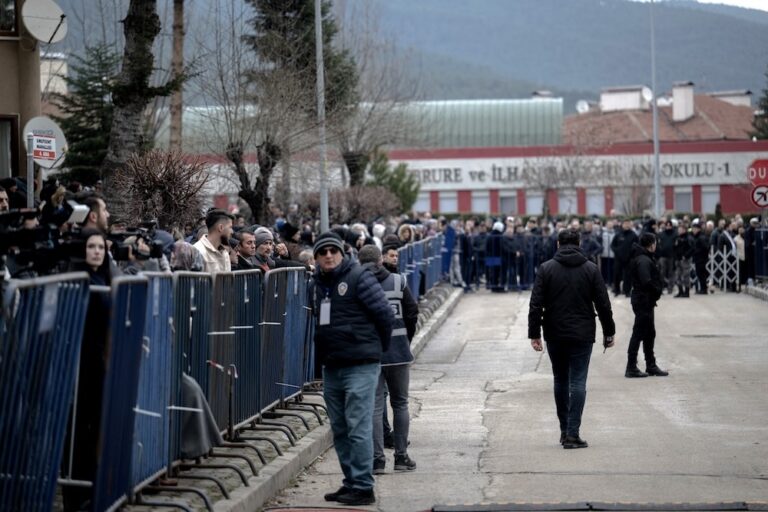Berivan Eker, former editor-in-chief of "Renge Heviya Jine", was arrested on charges of "spreading propaganda for an illegal organisation".
(BIANET/IFEX) – Berivan Eker, former editor-in-chief of the “Renge Heviya Jine” women’s magazine, was arrested on 5 December 2010. Her predecessors, Gurbet Cakar, Sultan Sonsuz, Ruken Aktas and Sibel Esmer are all either convicted or facing prison terms. “Renge Heviya Jine” (The Colour of Women’s Hope) is the only women’s magazine in Turkey published in both Kurdish and Turkish.
The number of journalists in detention in Turkey went down by one due to the recent release of Erdal Guler, former editor-in-chief of the “Revolutionary Democracy” (“Devrimci Demokrasi”) newspaper. However, it quickly increased again by one when Eker was arrested because of her articles.
Two investigations were launched against the journalist on charges of “spreading propaganda for an illegal organization” and, based on articles from June and July, on “committing a crime on behalf of an illegal organization”. The investigations were subsequently merged.
Eker was taken into police custody on 5 December to give a statement. She had not been informed about the investigations because she was out of town. She was arrested as she was on her way to consult her lawyer about the upcoming trial. Eker is currently detained at the Diyarbakir E Type Prison.
During a 7 December hearing of the case, the 6th High Criminal Court of Diyarbakir (south-eastern Turkey) dismissed a request for Eker’s release. The hearing was attended by Eker and her lawyer, Meral Atasoy. Atasoy filed an appeal against her client’s detention. Should this appeal be rejected as well, Eker will have to remain in detention until the next hearing on 25 January 2011.
Public Prosecutor Ahmet Karaca demanded in his final speech that Eker be punished on charges of “committing a crime on behalf of the PKK [the militant Kurdistan Workers Party] without being a member of the organization”, “membership of an illegal organization” and “spreading propaganda for an illegal organization”.
The prosecutor pleaded for Eker to be charged under Article 5 of the Turkish Criminal Code, which allows for heavier sentences. He also called for an application of Articles 220/6 and 314/2 of the Turkish Penal Code (TCK) and a two-count application of Article 7/2 of the Anti-Terror Law. If convicted, Eker faces 21 years in prison.
The charges brought against the journalist stem from articles in which she referred to imprisoned PKK leader Abdullah Ocalan as the “leader of the Kurdish people” and “leader Apo” (Ocalan’s nickname), described the PKK as the “leadership movement”, and praised alleged PKK member Nazan Bayram.
BACKGROUND:
The magazine’s former editor-in-chief, Gurbet Cakar, was arrested by the Public Prosecution of Diyarbakir, a Kurdish-majority province in south-eastern Turkey, when she went to the prosecution to give her statement. The prosecutor demanded prison terms of up to 20 years for Cakar on charges of “spreading propaganda for an illegal organization via the media” and “membership of the PKK”, the outlawed militant Kurdistan Workers Party.
Sultan Sonsuz, first editor-in-chief of the women magazine, is indicted under charges of “propaganda” in five different cases. Sonsuz was sentenced to imprisonment of one year and three months in one of these trials. She is facing between four years and nine months and 20 years behind bars in the remaining four trials. Her successor, Ruken Aktas, is facing three years and nine months in prison.
Aktas brought her three cases before the Court of Appeals, after which one of the cases was dismissed. Aktas’s successor, Sibel Esmer, was sentenced to one year and three months in prison on “propaganda” charges by the Diyarbakir 6th High Criminal Court. She appealed the decision.
Three other Turkish journalists are currently behind bars, namely Vedat Kursun and Ozan Kilic, both former chief editors of the Kurdish newspaper “Azadiya Welat”, and Bedir Adanir, owner of Aram Publishing and official of the Kurdish newspaper “Hawar”. Additionally, more than 25 journalists are in jail for alleged affiliations to terror organizations.


